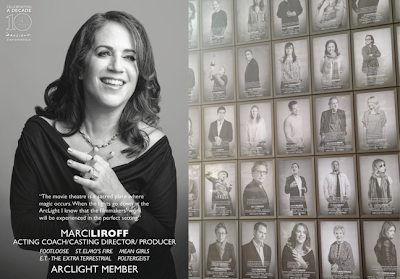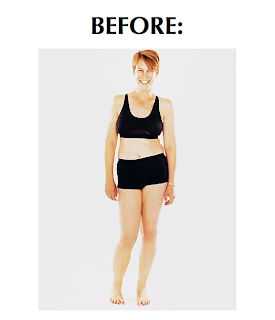By Marci Liroff
Many times casting feels like an invisible job. No one seems to know or understand what we do as casting directors. Actually, if I’m doing my job correctly, the casting should disappear into the movie. The ensemble that I help put together with the filmmakers should work so well that you don’t realize that they are actors up there on the screen…just like how Meryl Streep disappears into every role she plays and becomes people like Julia Child, Margaret Thatcher and Karen Silkwood (Silkwood -a favorite of mine from director Mike Nichols).
You can imagine my surprise when I was asked to be on the wall of some very notable filmmakers at The ArcLight Cinemas 10th Anniversary celebration in a poster sized photo. Shocked would be more like it. Casting is such an over-looked part of the filmmaking process. People that should know better – the producers, studio execs, network execs, writers, actors and some directors still don’t quite understand what it is that we do. How many times have you heard a director say, “Yes, I found her after searching high and low. I knew when I first set eyes on her that she was perfect for the part!” In reality, the casting director has been searching the globe, watching sometimes thousands of auditions in person and viewing hours and hours of auditions sent in from hopeful actors around the world.
Joel Schumacher is a director I’ve worked with a couple of times who always gives me credit where credit is due. He will always make a point of telling people that I literally made him meet Isabella Rosellini years ago when we were doing a little gem of a movie, Cousins. The role wasn’t written for an Italian woman and Joel just couldn’t see it. I begged, I pleaded that this was perfect casting and would give us a sentimental thread to connect to the original film ours was based on, Cousin, Cousine. After spending just a few minutes with her, he knew she was the one and with a very easy re-write of a line or two, she added a wonderful element to the movie. I remember in my initial interview with Schumacher I suggested Mare Winningham for the role of Wendy in St. Elmo’s Fire. Sometimes you just know.
Same was true with Lindsay Lohan on Freaky Friday. When I suggested her for the lead in Freaky Friday in my initial meeting with the director and producers, she had done The Parent Trap for Disney a few years back and for some reason they just didn’t want to use her again after she had already done a reboot of a famous film (both Freaky Friday and The Parent Trap were popular films in the 60s and 70s. Did you know Jodie Foster starred in the original Freaky Friday?!). I had Lindsay self-tape her audition from New York and when we saw it we were less than impressed. But, I still just knew she was the one. I talked to her on the phone and gave her some notes from the director and myself and had her do it again. The new self-tape was better – enough to have us fly her from NY to Los Angeles for a screen test. When she arrived for hair and makeup we were shocked. Lindsay was so embarrassed about her freckles, she had gone out and gotten a spray tan. She showed up sporting a bright orange glow. Think carrots. This was back in 2002 and believe me when I tell you that the technique of spray tanning has come a long way since then! We immediately hustled her into makeup where we spent the next couple of hours trying to “take down” her color to a human level. She won the role because she was so good with great comedy timing, and had great chemistry with our lead actress Annette Bening.
– Sidebar: Lindsay tested with Annette Bening who was cast in the role of her mother. Two weeks before we were to shoot, we still didn’t have a full script. We were receiving the re-writes 10-20 pages at a time, and Annette just wasn’t comfortable going ahead without seeing the entire script and she pulled out. Because she pulled out, Tom Selleck, who was to play her fiancé, pulled out . Then Gary Marshall had to quit (he was to play her father) because his film Raising Helen changed their shooting schedule. Then Chad Michael Murry thought he should jump ship too. I talked him into staying. I think I threatened his future career truth be told! I came up with a list of replacements. I remember championing Julianne Moore. The head of the studio at the time, Nina Jacobson, had just seen Jamie Lee Curtis on the cover of Shape magazine. In the article, she showed the before/after photos of what a real woman looks like sans makeup and Photoshop. It was brilliant and the town embraced her. We hired her and she jumped in fearlessly into rehearsal and pre-production just 10 days before we started principal photography. The rest is casting history. Can you even imagine Annette Bening in this part?
Another great casting story happened on the original Footloose. Many times I like to think outside the box when I read a script. When I was coming up with ideas for the Reverend Shaw role, I had just seen John Lithgow in Brian DePalma’s Blowout playing a serial killer as well as in The World According To Garp playing a transsexual who was adjusting to her new body. I thought he was a spectacular actor. The role was written as a salt & pepper haired, Paul Newmanesque, charismatic man. You can just imagine the look the director, Herbert Ross, gave me when I brought him up. This was another case where I stomped my feet and insisted he audition him. This was 1983 and I remember his audition as if it was yesterday. We read the scene where Shaw admonishes his daughter Ariel (played by me in the audition!) for coming home late because she’d been out dancing. Lithgow read the scene with such intensity and such love. I get chills whenever I think of it. The director gave him the role right then and there in the room.
During awards season, when I see Martin Scorsese thank the brilliant casting director Ellen Lewis when accepting his award for his films and television, you know we’re getting somewhere!
So you see, this is only a small part of what we do as casting directors. We help bring films to life by putting together the perfect ensemble of actors. I’ve always thought of myself as a filmmaker and I’m so glad others are starting to see it too.
(ArcLight photo by Doug Hac)
What are some films you’ve seen lately where you thought the casting was seamless and brilliant? What are some films you thought were miscast?








Recent Comments